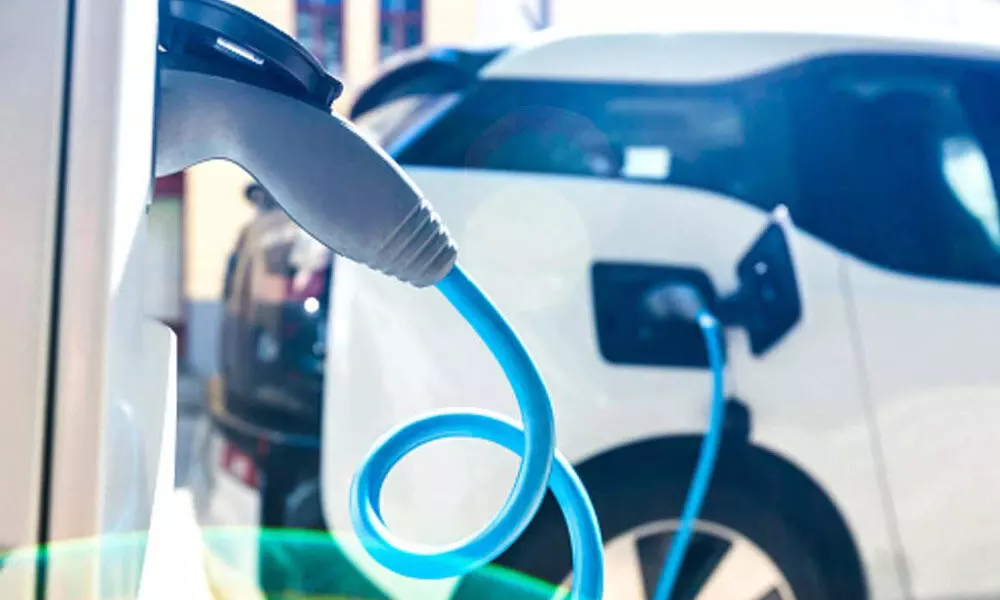EV startups seek cut in customs duty, road tax
Sector bearing the brunt of ongoing Indo-Chinese tensions
image for illustrative purpose

New Delhi: Electric vehicle (EV) companies in India are picking up pace in the market with many looking forward to the upcoming Union Budget FY 2021-22 for a boost in the sector. Bizz Buzz spoke to EV startups to gain an insight on the growing popularity of EVs in recent years and how the sector is bearing the brunt of the ongoing Indo-Chinese tensions.
As of July 2020, the Central government has introduced 15-25 per cent customs duty on solar and battery components from foreign countries to discourage import from China and promote Atmanirbhar Bharat or 'Make in India' initiative. EV companies are hoping that this year, the Central government can give a push to the sector by lowering the customs duty on raw materials and slashing road tax altogether for eco-friendly vehicles.
Hiten Pal Saklani, head of innovations at Micelio, one of the fastest-growing EV startups in India, shed light on the changing dynamics of the industry in India and the challenges EVs faced in 2020.
"Startups always require investments, and it was due to Covid that has dried up. In the electric vehicles domain, all the startups are hardware companies. They require actual material unlike the software companies. Hence, the (pandemic) impact was adverse as many entities wind-up their businesses because of lack of funds to sustain their team or continue their prototyping activity and development of their vehicles. But more or less, the rebound has been good enough. Many companies, in the recent months, again started raising money and the investment has already begun. After almost five months, the EV sector has now gained momentum again. When compared to the situation from March to June/July, we have overcome that in the last five months," Hiten told Bizz Buzz. "The security issue with China has led to a lot of disruption into funding and how companies generally work. There were companies which required assistance from both Chinese and Indian companies, but because of different deterrent factors, they now ceased to exist in the EV market. India does not have a large vendor base for battery and solar components," he further explained.
"The Indian government has given a primary priority to domestic companies in the form of discounts/relaxation on EV vehicles. But now it is not applicable to those vehicles which are made up of parts imported from China or other foreign countries. That has again affected the industry because in India there are very few factories which manufacture (EV) components."
A general consensus among Indian electric vehicle companies is the quality of the solar and battery-based components from China. The Indian market receives around 83 per cent of solar and battery-based raw materials from its Chinese counterparts. The Indian EV manufacturing eco-system, although getting an encouragement from the Central government, is still not the primary choice of EV companies in the country due to quality expectations and price difference. Many believe that it will require 5 to 10 years to achieve a considerable position to compete with Chinese manufacturers.
Lithium-ion battery manufacturers in India procure cells from China. Indian manufacturers, on lithium-ion cells, pay basics custom duty (BCD) of 10 per cent and integrated goods and services tax (IGST) of 28 per cent, which makes up to total duty of roughly 40 per cent.
Arjun Madre, Founder of Gev-Gayatri Electric, a three-wheeler EV company based in Noida, said that EV companies can greatly benefit from the reduction on the GST, selling tax and road tax.
Similar to maximum EV companies in India, Madre's company, too, is reliant on China to purchase raw material to build its e-rickshaws. The primary reason for this reliance on Chinese market is the cheaper price and standard quality of raw materials.
"The market was badly affected by Covid-19 crisis and lockdown, but once the lockdown was lifted we are now slowly picking up orders. Our target audience is the economically marginalised rickshaw-walas, but once the pandemic began the end-users migrated back to rural areas as they couldn't ride the EV for a living. However, unlike before, we are now focusing more towards customised electric vehicles such as food and vegetable carts and ice-cream carts," Madre added.
"The EV manufacturing sector in India is still not advanced enough to attract most companies. Most manufacturers, who claim to be Indian-based (via Make In India initiative), are simply getting the products from China only and assembling them at their factories. The truth is that Indian manufacturers cannot compete with the Chinese given the quality of the raw material."
"A lot of people thought that the EV sector is a goldmine but if you dig deeper, there are challenges as well. I hope in the upcoming Union Budget, the government considers waiving off the road tax for EV vehicles. We are engaged with the State governments of Haryana and Madhya Pradesh for supply of EV garbage vans to local municipalities. So, my expectation would be that the Central government promote EV vehicles and reduce the tax slab, up to 5 per cent to 12 per cent, on raw materials," he added.

